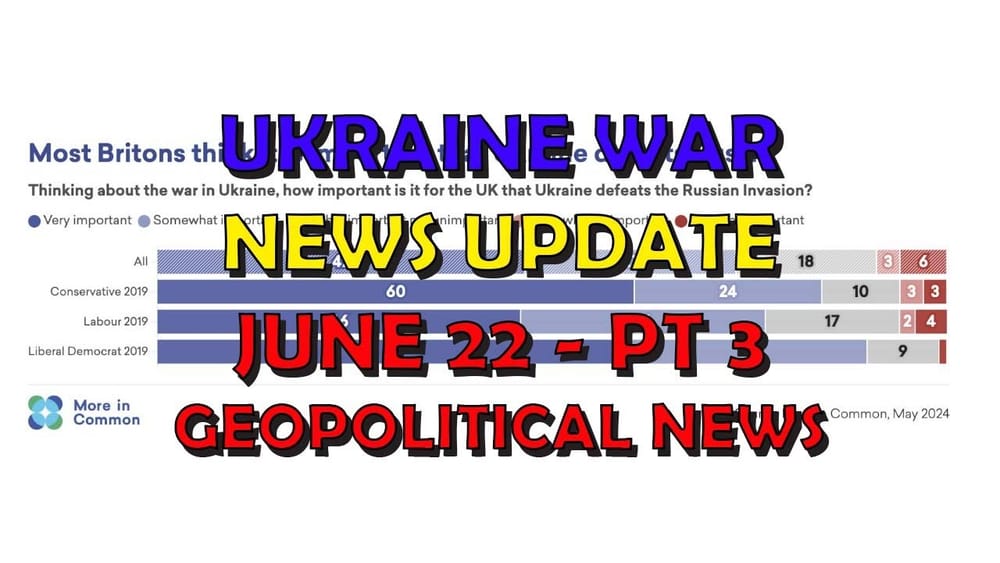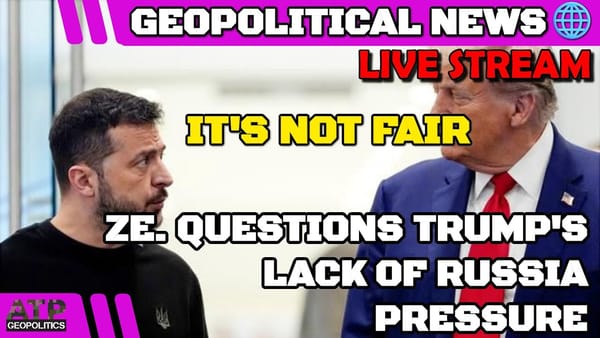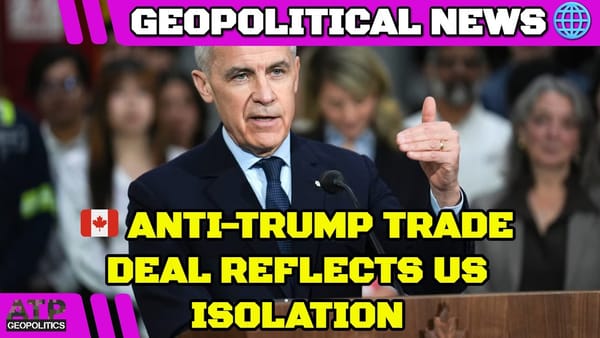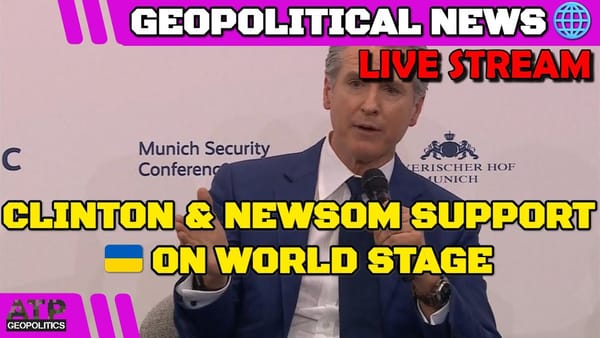Ukraine War Update NEWS: Geopolitics News
Table of Contents 📖
"It's like, yeah, Russia, the bad guys, we need to help Ukraine, Ukraine, the good guys. And it's that simple."
Hello Team
🎦 00:00-00:11⏩
Jonathan welcomes viewers to another video and explains that this is the third part of the Ukraine War Update for the 22nd of June, focusing on geopolitics.
Return to top⤴️
Nigel Farage: Pro-Putin Stance and Its Backlash
🎦 00:11-14:02⏩
- Jonathan kicks off by discussing Nigel Farage, leader of the Reform UK party, and his recent controversial statement echoing Putin's narrative, blaming the West for provoking the war in Ukraine.
- He provides context about Farage's political background, labelling Reform UK as a "single-issue party" focused on immigration.
-Jonathan criticizes the lack of media scrutiny on Reform UK's policies beyond immigration.
- He plays a clip of Farage from a BBC Panorama interview where Farage claims to have predicted the war in Ukraine back in 2014, attributing it to NATO and EU expansionism. Farage argues this expansion gave Putin a reason to tell the Russian people "they're coming for us again."
- Jonathan points out the fallacy in Farage's argument, highlighting that Russia's invasion of Crimea in 2014, where they used unmarked soldiers ("little green men"), had nothing to do with NATO expansion. He argues that blaming NATO is a post-hoc rationalization used as an excuse.
- Jonathan then brings up an article from 2020, where Farage, during his time with the Brexit Party, voted against tighter restrictions on Russian propaganda in the EU. He criticizes Farage for this decision, highlighting the proven existence of widespread Russian propaganda efforts.
- He then references the Cambridge Analytica scandal and draws parallels to Farage's stance.
-Jonathan criticizes Farage and Trump for echoing the same sentiments regarding NATO expansionism.
- He highlights the overwhelming support for Ukraine in the UK, citing a poll where 74% of Brits believe in the importance of a Ukrainian victory. Jonathan suggests Farage's stance is strategically unwise given this public sentiment.
- Jonathan criticizes platforms that provide a voice for pro-Russian narratives, drawing parallels between figures like Farage, Trump, and Matt Gaetz in the US.
- He details the strong reactions from UK politicians across the political spectrum, including Prime Minister Rishi Sunak and Labour leader Keir Starmer, who both condemned Farage's claims. Sunak called it "completely wrong" and "dangerous," while Starmer labelled it "disgraceful."
- Jonathan expresses concerns about the dangers of Farage's appeasement, emphasizing the need for a united front against Putin's aggression.
UK Public's Stance on Ukraine and the Information War
🎦 14:02-17:01⏩
- Jonathan observes that despite Farage's stance, there's strong bipartisan support for Ukraine in the UK. He references a comment by a viewer named Luke Trill who shared a poll showing that 74% of Brits believe Ukraine's victory is important.
- He then shares an anecdote about a conversation with his friend, Tom Williamson, highlighting that some left-leaning individuals, while disagreeing with Farage's overall politics, find common ground with him on NATO expansionism.
- Jonathan expresses concern about anti-US imperialism sentiment, acknowledging that he himself used to hold similar views. However, he emphasizes that his understanding of geopolitics has evolved, and he now believes the US's stance on Ukraine is justified. He clarifies his position by stating his disapproval of the Iraq war and acknowledging US imperialism in South America.
- He stresses the simplicity of the situation: "Russia, the bad guys, we need to help Ukraine, Ukraine, the good guys." Jonathan asserts that it's Putin's responsibility, not NATO's.
- Jonathan reiterates his point that NATO expansionism is a convenient excuse, not a genuine reason for Putin's actions. He points out that Putin barely mentioned NATO in his 7,000-word essay published before the 2022 invasion, further solidifying his argument that blaming NATO is a fabricated justification.
- Jonathan laments that Russia is winning the information war, comparing the spread of pro-Kremlin narratives to a virus infecting people's minds.
Robert Kennedy Jr. and Pro-Kremlin Narratives
🎦 17:01-20:05⏩
- Jonathan transitions to the US political landscape, highlighting that Biden faces three Kremlin-backed candidates in the 2024 election: Jill Stein, Robert Kennedy Jr., and Donald Trump.
- He specifically calls out Robert Kennedy Jr. for "laundering verbatim Russian propaganda narratives" to US audiences.
- Jonathan reads a tweet from Robert Kennedy Jr., criticizing the US's stance on Ukraine and drawing parallels to the Vietnam and Afghanistan wars. Kennedy argues that escalating the conflict will only lead to more death and destruction.
- Jonathan challenges Kennedy's naive perspective, suggesting that allowing Putin to conquer Ukraine would embolden him further, potentially leading to further aggression in Europe and strengthening the Russia-China alliance.
- Jonathan expresses a desire to engage with Kennedy and Trump in a constructive dialogue, urging them to provide a well-reasoned explanation for their understanding of the conflict in Ukraine. He believes this would expose the flawed logic underpinning their pro-Kremlin stance.
US Sanctions on Russia and EU Security Guarantees for Ukraine
🎦 20:05-21:17⏩
- Jonathan shifts to the news that the US has closed down the Russian visa centre and is revoking tax privileges for Russian diplomats. He sarcastically remarks, "Oh, boo-hoo," mocking the Russian ambassador's complaint about the additional burden this places on their shoulders.
- He then reports that the EU and Ukraine are likely to sign a security agreement, potentially as early as June 26th, signalling strengthened ties and support for Ukraine's security.
Island Nations Join Peace Summit Communique
🎦 20:41-21:17⏩
- Jonathan notes that two more countries, Barbados and the Marshall Islands, have joined the peace summit communique, bringing the total number of signatory nations to at least 79. He welcomes this development.
Slovakia's Pro-Russian Turn and Its Implications
🎦 21:17-32:09⏩
- Jonathan delves into an interview with Slovakia's former Defence Minister, Yaroslav Nad, published in the Kyiv Independent. He praises the interview as "super amazing," foreshadowing its significance.
- He summarizes the context, explaining that Nad and Slovakia's former Foreign Minister are facing legal action for their role in sending MiG-29 fighter jets to Ukraine under the previous government.
- Jonathan criticizes Slovakia's current Prime Minister, Robert Fico, and his pro-Russian stance. He points out the irony of Fico's government pursuing legal action against Nad for aiding Ukraine while simultaneously praising Russia.
- He highlights Fico's contradictory behaviour, noting that while he signed a joint communique with Ukraine expressing support, he later downplayed its significance. Jonathan criticizes Fico for claiming Ukraine is the "most corrupt country in the world" while ignoring Russia's well-documented corruption.
- Jonathan argues that Fico and his government are engaging in a circular process: they create a pro-Russian sentiment among the electorate through propaganda, then point to this sentiment as justification for their pro-Russian policies.
- He shares a personal anecdote about a conversation with a viewer, Denisa, originally from Czechoslovakia, who was shocked by the prevalence of pro-Russian propaganda during her recent visit to Slovakia.
- Jonathan connects Denisa's experience to the broader issue of the "information ecosystem," arguing that constant exposure to pro-Kremlin narratives shapes people's views. He argues that figures like Trump, Musk, and Farage operate within these echo chambers, perpetuating harmful disinformation.
- He then returns to Nad's interview, highlighting the concerning trend of rising pro-Russian sentiment in Slovakia, fuelled by disinformation campaigns. Nad reveals that Slovakia ranks among the most susceptible nations to Russian propaganda within the EU and NATO, second only to Bulgaria.
- Jonathan criticizes Fico's government for dismantling the structures Nad's administration had put in place to combat Russian propaganda.
- Jonathan draws a parallel between Fico's actions and Farage's voting record on Russian disinformation, emphasizing the dangers both figures pose. He calls for transparency in Reform UK's funding, suggesting potential links to Russia.
- He then points to the irony of Fico emulating Hungary's Viktor Orban, a leader known for his authoritarian tendencies, while simultaneously being critical of the EU's attempts to address Orban's undemocratic practices.
- Jonathan condemns Orban's tactics, highlighting his use of Hungarian media to interfere in Slovakia's election and spread pro-Fico propaganda.
- He quotes Nad, who criticizes Orban for exploiting an assassination attempt on Fico for political gain by falsely blaming leftists.
- Jonathan discusses the challenges of dealing with leaders like Orban, who use their veto power within the EU and NATO to obstruct progress. He argues that while expelling Hungary from these organizations is a difficult decision, Orban's actions may necessitate such measures.
- He notes that Slovakia and Hungary have been excluded from several high-level meetings, citing an example of Czech Prime Minister Petr Fiala expressing concerns about Fico's presence at a meeting in Paris.
- Jonathan concludes that while Fico's victory may have been democratic, the pervasive influence of Russian propaganda undermines the fairness of the election. He argues that manipulating the electorate's knowledge equates to manipulating the election itself.
- Jonathan emphasizes that evaluating an election's fairness requires considering the media landscape and the extent of external interference. He warns against the dangers of democratic backsliding, citing Hungary as a prime example, where democratic institutions have been systematically eroded under Orban's rule.
- He warns that such backsliding can happen gradually, with incremental changes chipping away at democratic norms until it's too late.
Germany: Arrests for Suspected Espionage and Protests at Russian Embassy
🎦 32:10-33:46⏩
- Jonathan reports that three individuals have been arrested in Germany on suspicion of spying for a foreign intelligence agency, presumably Russia, highlighting the ongoing espionage efforts on European soil.
- He also mentions the detention of a Russian citizen in Montenegro at the US's request for alleged election interference, further illustrating Russia's attempts to destabilize democratic processes.
- He lightheartedly mentions Ukraine's performance in the Euro 2024 football championship, noting their victory against Slovakia.
- He then shares a video clip of Polish football fans protesting outside the Russian embassy in Germany, shouting "Russia whore." Jonathan expresses amusement at their blunt condemnation of Russia's actions.
Belarus: Weaponization of Migration and Rising Tensions
🎦 33:46-35:00⏩
- Jonathan reports on the deteriorating situation at the Polish-Belarusian border, with the Polish Defence Ministry reporting an increase in attacks by "armed and well-trained groups" from Belarus.
- He notes the significant rise in warning shots fired by Polish border guards, indicating escalating tensions.
- Jonathan asserts that Belarus is weaponizing migration, echoing a claim made by Poland's Minister of National Defence. He explains that this tactic has been employed for some time.
France: Concerns about Ressemblement National's Rise and Its Impact on Ukraine Support
🎦 35:00-35:27⏩
- Jonathan shifts focus to France, reporting on concerns within the French military about the rise of the far-right Ressemblement National party. He explains that some military personnel are worried about the party's pro-Russian stance and its potential impact on France's support for Ukraine.
- He quotes a French soldier who expresses fear about the weakening of France on the international stage and the possibility of the country ending up "on the wrong side of history" regarding Ukraine.
- Jonathan notes the soldier's concern that figures within Ressemblement National aspire for France to become like Russia or Hungary.
- He contrasts this with the positive view of the current French government's support for Ukraine, acknowledging the efforts of Defence Minister Sébastien Lecornu and others.
Russian Propagandists and Nuclear Rhetoric
🎦 35:27-35:33⏩
- Jonathan juxtaposes the concerns in France with the rhetoric emanating from Russian state-sanctioned propagandists who advocate for escalating the conflict, even suggesting a willingness to resort to nuclear war. Jonathan expresses his disgust, stating sarcastically, "Nothing like a good bit of nuclear genocide."
Armenia: EU Membership Discussions and Shifting Alliances
🎦 35:33-36:28⏩
- Jonathan reports that for the first time, Armenia's parliament has discussed the possibility of joining the EU, suggesting a potential shift in the country's geopolitical alignment.
- He clarifies that while EU membership for Armenia seems like a distant prospect, the discussion itself is significant, indicating a move away from Russia's sphere of influence.
- Jonathan points to Armenian Prime Minister Nikol Pashinyan's recent statements and actions, which have not aligned with Russia's interests. He sees this as further evidence of Armenia's distancing from Moscow.
- He highlights France's role in this shift, linking Macron's visit to Armenia with the country's recent purchase of French-made Caesar self-propelled howitzers. Jonathan suggests that France is strategically using arms sales to bolster its influence in the region.
China, Taiwan, and the Importance of Supporting Ukraine
🎦 36:28-38:35⏩
- Jonathan brings up insights from Jimmy Rushton, a Kyiv-based foreign policy and security analyst, emphasizing his credibility.
- He quotes Rushton, who questions why some US foreign policy experts advocate for reducing support for Ukraine to focus on China, while simultaneously, China itself seems invested in ensuring Ukraine's defeat.
- Jonathan challenges the argument that aiding Ukraine diverts resources from countering China, asserting that the US is primarily sending older military equipment to Ukraine.
- He explains that the US benefits from this arrangement by replenishing its own stockpiles with brand-new equipment, effectively using the conflict as an opportunity to modernize its military.
- Jonathan argues that the US's support for Ukraine serves a dual purpose: bolstering Taiwan's security and deterring Chinese aggression.
- Jonathan emphasizes that China is closely observing the West's response to the conflict in Ukraine, learning valuable lessons for its own strategic calculations regarding Taiwan.
Germany: Criticism of China's Support for Russia
🎦 38:35-38:59⏩
- Jonathan shares a statement from German Vice Chancellor Robert Habeck, criticizing China's support for Russia.
- Habeck argues that Germany would be less concerned about its dependence on Russian raw materials if China wasn't aiding Moscow's war effort.
Wrap Up
🎦 38:59-39:03⏩
Jonathan concludes the video by thanking his audience for their support.
Return to top⤴️




